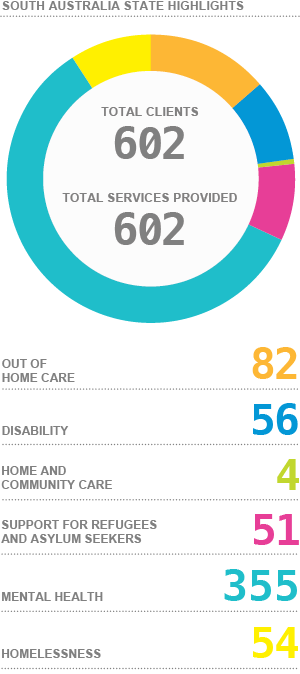
|
“The Peer worker role is based on the lived experience. And I just tell people “I’ve been there”, and they’ll say “Really? Then you know”. And when you share your own experience with somebody else, it can bring them out in the open - and can help them know, they aren’t alone.”
Reggie Black, Community Peer Worker, Berri, South Australia |
In South Australia, Life Without Barriers operated two client-based programs supporting people who are homeless with practical assistance in addressing causal factors: our Adelaide Metro Homelessness program; and our Riverland Assertive Outreach program in Berri.
Our Riverland service includes a facility that homeless people can use freely to wash, do laundry and prepare meals. During the year we relocated this service to a more easily accessible part of Berri and since that time have seen client numbers increase from several people a week to over 30 people a week. Our reputation for dealing honestly and openly with the many homeless people in the area, led to a local council request to facilitate a community meeting with people sleeping rough in the disused rodeo grounds.
“I regularly attend a family studies course at a southern Community Centre. I’m helping my niece to stop drinking by being her Mentor. I enjoy regularly attending The Southern Women’s Health Group….Other Organisations didn’t stick it out with me…But LWB kept coming back when I was down – They gave me hope!” (Adelaide homeless client)
Four emerging artists from our Living Arts program exhibited their work side-by-side with that of their professional mentors at the 2014 Adelaide Fringe Festival’s Side by Side – A Two Colour Collision. Proceeds from items sold went to the artists. Our Living Arts program aims to connect marginalised young people to the wider community through creative endeavours. By partnering with creative people and organisations the team tailors activities to meet the needs and wants of each individual. The Living Arts team was also invited to attend the first CREATE National Conference in Canberra, and to contribute three expressive arts projects across the weekend.
Back to Country is a significant part of the annual planning for the residents of the Aboriginal Men’s Home in Port Augusta. Now in its fifth year, the long term benefits of taking clients to the Aboriginal lands around Coober Pedy and the Anangu Pitjantjatjara Yankunytjatjara lands has started to emerge for the men in the program.
During the year, we organised a three-day Aboriginal cultural experience to the traditional Ngarrindjeri Land for teenage Afghani clients in our refugee and asylum seeker program. The Aboriginal Elder and guide, and his family, shared history, skills and knowledge of plants and animals with the boys, and they in turn shared their enthusiasm, interest and Middle Eastern food with him. This opportunity was the first time most of the young people heard the history of Aboriginal Australians during white settlement.
- Annual Riverland Aboriginal Men’s group and Zebra Finch Men’s group cultural exchange
- Riverland Aboriginal Men’s Support group White Ribbon Event
- White Ribbon Ambassadors
- Consultation, endorsement, implementation and facilitation of Here and Now Aboriginal Assessment tool
- Launch and unveiling of Aboriginal Men’s ‘Uncle Edward ‘Toot’ Lindsay’ Yarning Room
- Riverland Aboriginal Men’s Support group Cultural Retreat
Life Without Barriers developed its STORI-30 or the Stages of Recovery Instrument. This is a self-rating measure for use by consumers to measure their progress towards achieving their articulated mental health goals. It offers a standardised outcome measures that promotes discussion of a person’s recovery experience and journey. STORI-30 lends itself to generating valuable information for consumers than tools previously used, as it provides information people can use to direct themselves along their recovery journey.
We received state-wide funding for the three-month roll out of psychosocial support services through the National Partnership Agreement for our Improving Public Hospital Services (IHBSS). This funding is for sub-acute services for people at risk of becoming unwell or stepping back into the community following a short stay in hospital; and for home-based sub-acute mental health services. We were able to demonstrate that consumers in the IHBSS program had better outcomes with the provision of psychosocial support in the community.
Life Without Barriers and HEARING Inc held a Live Longer! sport clinic for 200 local Aboriginal children and their parents at five sporting clinics across the Riverland region. The sporting days promoted healthy lifestyles with a focus on the importance of an active lifestyle by enabling children to take part in a variety of local sports as well as traditional Aboriginal games and cultural activities. The project involved ongoing support and involvement from the Department of Education and Child Development, ACCARE, Flinders University, Riverland Community Health, Life Without Barriers and Country Health SA. The Live Longer! campaign is funded by the South Australian Government’s Department of Health and Ageing and is part of the $805.5 million Indigenous Chronic Disease Package.

